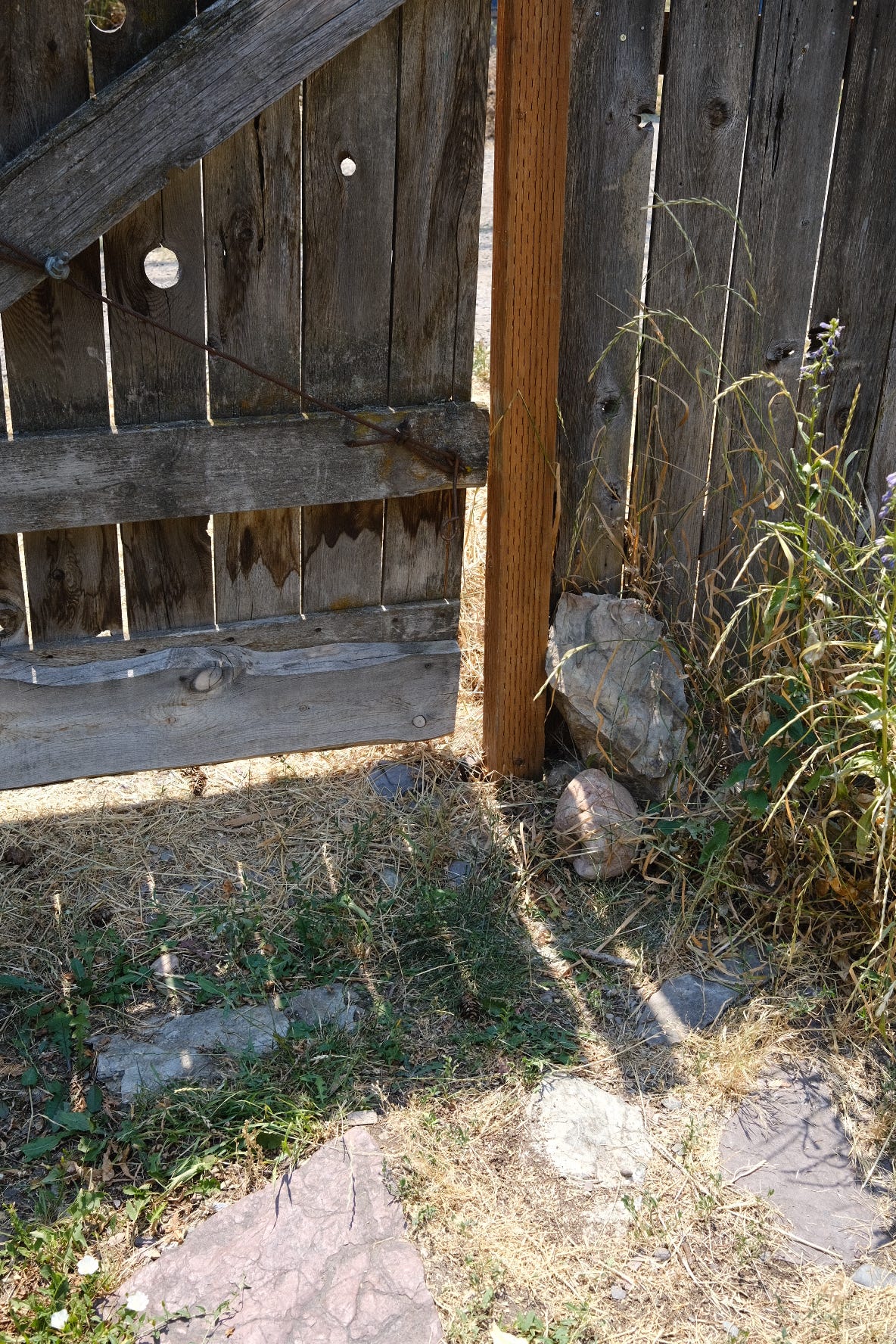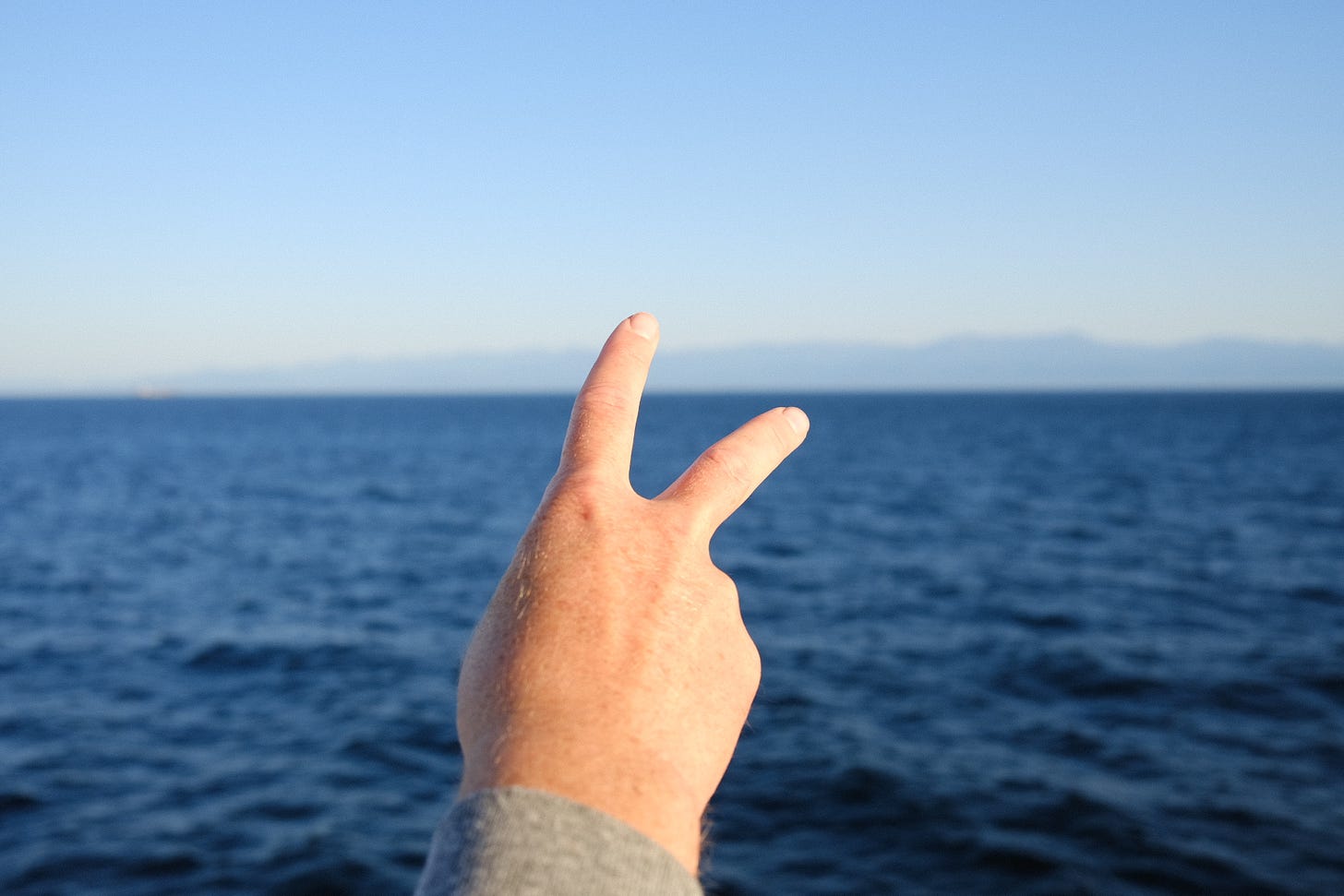Streaming Notes
Notes from the runoff, the mulch pile, the high season, the passenger seat.
May
I know I’m not supposed to be doing this while I’m driving, I begin, but mostly that’s for comedic affect. Actually, it’s very easy to drive with one hand out toward the wood kiln, in a straight line going westbound on Mullan, and to talk to Suzanne into my recording app, and to still keep an eye on the driver behind me, to gauge their anger through the rearview.
Already it’s hot this morning, the sky hazed and unclear. Distant deep green pines cut a blunt relief against the bright blue, their edges blurred by particulate. Probably the big acreage owners burning the last of their brush piles before the big fire restrictions come down, at least that’s what I hope. It’s too early for wildfire smoke to start drifting in, but then everything happens too early now. Another thing I guess I should get used to.
I always begin my recordings with the most basic things, my context: just a few environmental notes to set a scene, or get my brain going in the right direction. I say these notes out loud to myself, alone in my car: I’m heading out to the wood kiln for my second shift, dressed to shove split logs into the firebox for six hours, to try to get the temps up past a thousand. We had a good practice session last night: found the right drum line for the new song, even considered recording it beforehand. My summer classes are almost over, this second batch of papers almost graded. Yesterday I fell into a hole about the news, but today I woke up early and took two quick sips from a joint before my walk, which seemed to help.
Ahead of me, in the roundabout, cars swerve hard to enter. In the rearview the driver behind me grips the wheel, edges up close. Okay guy, I say to Suzanne, or to my open recording app, and press a little harder on the gas. I like these little moments, in her recordings to me, when life filters in—the interruptions from birds or traffic, a narrated distraction from her computer, the knee-jerk ugh! when coming across something dead in the street.
What was I saying? It’s been five or six minutes, so probably not much. My context period is over and I’ve arrived at the meat: arrived at the part of the essay, if this were one, where the throat-clearing is over and there is something to say. All around me, anonymous sand-colored golf course houses and rolling agricultural fields. The long metal apparatus for watering I still don’t understand. My thoughts bubble and foam over. The driver behind me turned off at some point, and now no one’s there.
A little electrical wave goes through me, through my whole blood, with the impulse to hit the round red button and scrap the whole thing. This little wave comes at some point in every recording I make, when a sudden bright consciousness considers how I could be writing this all down instead. How I’m always flitting from one place to the next, mind constantly streaming, needing to talk. But then this in itself is so interesting, isn’t it? In a way I have no idea why I love these recordings so much, I begin again, gliding further down the road, out toward the mountain in the heat.
June
I had fun the morning of the show, following Jay around town in a light mania from place to place. We brought in our instruments and sound checked at noon, where I was shocked at how comfortable I felt on the stage, how rich and effortless the monitors made us sound. I sang a little, and Noah said it’s so beautiful from up in the booth, and this released me from whatever wisps of fear, for now, remained. After that we were free to wander or eat or vibrate for another two hours until the show began.
I hadn’t smoked for a few days, and the heat was vivid—the first real heat of what had been a mild summer. The not-smoking was in service of my throat, and the film or bubbles or scratches (?) that formed in the throat, and as we talked through the options for lunch I thought of these things, and we eliminated our options that way. I’m eating for singing, I kept saying, or some variation of that, which I thought was funny. I needed singing food, singing drink, etc. We got juice and brothy soup even though it was already so hot, and then sat on iron chairs out on the busy sidewalk and watched the tourists walk by.
I was thinking that for a song to really work right you had to choose words that matched the tone of your soul, or that complemented the soul in an interesting way. Each of these words became the soul’s bridge out of you, through the air, toward the bodies of the people listening: little islands for the soul to step on as it bounded away. The wrong words, flimsy or false words, could make the soul fall out weird and drop hard to the ground. This was something I believed everyone could recognize. I was trying not to think too hard about this, either.
Afterward, it was difficult for me to think about anything other than the fifteen (probably) seconds where I’d fumbled the chords, and repeated a couple lines from the previous verse before catching up again. The monitors had gotten dissonant toward the end, or I faltered hearing me too much: hearing and adjusting at once. I hugged the friends who had come to see us, who said so beautiful, so fun to see you guys play, and I thanked them and told them I was happy they came. I bought a can of cider I wasn’t sure I wanted, just to hold something. Then I stood in the back watching Phil sing, watching his soul leap through the air, and practiced believing what they’d said.
July
It was during our stay in the rented garden cottage in coastal British Columbia that we settled into the routine we’d always wanted. In the morning we made cordyceps coffee in the little coffee maker and drank it on the sunny porch, gazing at our host’s trellis of nasturtium and flowering sweet pea, reading our books together in silence. We ate local fermented coconut yogurt, squeezed from a biodegradable pouch, out of tiny matching bowls. I don’t even like yogurt, I kept thinking, or beginning to think, as I spooned tender bits of rhubarb into my mouth—trailing off at the ambient conclusion that everything here was superior, that this superiority erased any previous knowledge of what I liked, and that this erasing was itself the actual thing we may have traveled so far to experience: what I was actually here to do.
We left our phones on the counter to die. We ate ground mushroom capsules we’d brought with us in a jar of mixed vitamins, one each. We passed by rows of our host’s raspberry bushes, picking a few each time, on our way into town. We sat on generous public benches listening to European accents. We bought a single breakfast wrap to split and ate it in the grass by the skate park, noting that the kids here seemed less doomed, more spatially aware. We took more capsules, more gummies, and walked to the ocean. We rented those goofy electric bikes I’d so despised at home, and rode them as fast as we could along a smooth stretch of mixed-use coastal trail for thirty miles, laughing. We ate dense bowls of fish and rice and greens, over which we discussed our lucid plans to finish books, organize photos, release recordings. We could do this; we were capable. We admitted, finally, how much we’d missed the beach.
From this perch—embedded within a citizenry whose taxes pay for their healthcare, inhabiting a township with bountiful architectures for resting, fresh water bowls on the sidewalks for dogs, and far away from our to-do lists and workspaces—I received the glancing news of an attempted presidential assassination with surreal detachment. That morning the sky had been a deep warm blue first thing, right out the window: a kind of immediate blue I didn’t know was possible on a northern coast. I scanned the headlines for something concrete, some digestible timeline, and then the photo eclipsed all of it—his waxy fist, the streaks of thin red blood. My mind blinked out what a shitshow calmly, neutrally. Then I closed my laptop and returned to the porch.
August
An essay is a little like a compost pile. You put living or just-freshly-lived experience into it, and over time, with shifts in weather and moods and significant historical events, the pile begins to decompose. Thoughts that were once whole and sensible become spongy: solid assessments begin to rot. More information enters, more memes, waves of cynicism and despair, freak weather events, personal tragedies, physical exhaustion. The pile gets petrified in an envelope of time, or else mulched into unrecognizable slush. Difficult to pin on a wall.
I haven’t felt like writing in months. Haven’t felt like chasing the breakneck rate of this moment’s decomposition, trying to arrange my future compost in a thoughtful or significant way, to articulate it all quickly before it breaks down. All spring we reverted to the same refrain—too much GOIN ON—passing one another in the house on our way to trim bowls or pick up the new studio keys. I forced a half dozen false starts of essays about poetry, visions, and work: all mulched. It hailed and then it was sunny, the heat wave ripped through, the storm took down the neighbor’s tree. Last night after exiting the grocery store, the sun was setting so big and red on the smoky horizon that we drove in a wide loop trying to find a vantage point to take a photo without telephone wires or buildings, but couldn’t find one, and then it was gone.
This, I recognize, is life—fleeting sensory moments collapsing into one another, wilting out of memory, becoming our ambient interior: our thick striated layers of self. I like the seasons of my life in which I’m merely a participant in the stream of experience, bearing witness to its passage and accumulation without feeling the need to record. Week- and month-long blurs of evening walks, dunks in the river, scattered municipal critiques, tweaked sleep schedules, aimless weekend drives. Looking through the new prints together, at evidence of our bodies circumnavigating an alpine lake, we wonder: when the hell was that?
To be an artist, at least outwardly, requires a distillation of some aspect of the stream of living. Requires pausing living; requires the (often false) isolation of one of living’s aspects. From the dirt of conscious experience something is excavated, assessed, stylized, and shared widely. A little hunk of narrativized ore.
At our last coffee date, the day the truck was scheduled to load two of her moving pods to take to Los Angeles, Claire said I feel like your newsletter hasn’t been happening. We joked about what it would be like if I wrote diligently, every Monday. Happy Monday, everyone! I announced, fake-typing on my fake keyboard, and we laughed. It was funny because I couldn’t do it, and wouldn’t want to: because newsletter wasn’t the right word for whatever it is. We hugged goodbye with real tenderness. Later, alone, I spent a half hour sifting through my drafts—decomposing piles of words, already less relevant than they were one week ago—and wondered if anyone else had noticed.
Keep reading with a 7-day free trial
Subscribe to Field Notes to keep reading this post and get 7 days of free access to the full post archives.





